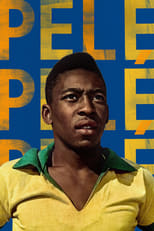The Netflix documentary Pelé has all the makings of a prestige film: a man known as the greatest footballer in the world, the only player to have won 3 World Cups, and celebrity in the historical context of a brutal dictatorship. The twist in the story is that you see an aged man at his most physically vulnerable, who cries at remembering all the pressure he withstood to make his fans happy.
Unlike a typical documentary that would show you most of a player’s life story, this production from Ben Nicholas and David Tryhorn centers on 12 years during which Pelé played in 4 World Cups. Though a breakout star at 17, at 29 his coach deems him unfit to play in WC 1970. And yet, his country expects him to lead them to another victory and a celebration that will lift their downtrodden spirits. This is the struggle that brings him to tears, explaining that:
“…the biggest gift you receive in victory isn’t the trophy. It is the relief.”
Pelé
In the chronicle of Pele’s growing stardom, the documentary is very well done and shows footage of him that was almost lost to history, such as early games, his personality off the pitch, his first wife, and his commercials (Café Pelé é delicioso!). There are many interviews of Brazilians who played with him, but they are players who I have no idea who they were.
Over the first half of the film, it was difficult for me to find a new connection to his story. In addition, I was a little irked that the filmmakers ignored Garrincha‘s role in Brazil’s World Cup titles.
Pelé eschewed politics
The film finally struck a nerve when it covered the dictatorship of General Medici, because I asked myself, what dictatorship? Why don’t I remember this? And of course, after the 2020 election, I was sensitized to the word dictatorship, knowing that the USA had narrowly escaped establishing one.
I went through my old notes and reviews and realized that even though the military dictatorship in Brazil ran from 1964 to 1985, the regime’s brutality had not registered with me. Soccer movies had alluded to it with such nuance that the dictatorship’s impact was like that of a bad cold instead of a cancer.
Is this because of censorship, marketability, or is it a cultural tendency for Brazilians to celebrate today rather than scrutinize the past? For examples, see my reviews of The Year My Parents went on Vacation, which takes place during WC 1970, and the push for Democracia em Preto e Branco that Socrates and Corinthians exercised during the regime’s end.
Even if not highly emphasized, it is good that the Netflix documentary mentions Pelé’s relationship with the dictatorship. Pelé was the most marketable footballer for decades but chose not to be political. By doing so, and by winning World Cups, he bolstered the regime, whose leaders recognized football as the opiate of the masses. To see how often this happens, check out my reviews under the tag politics.
Today’s players are told, “use football, but don’t let football use you”. And yet, there has been almost no way to accomplish this in a political arena. Socrates’ Corinthians team was one of the few. While today’s generation of players has been more open on social media, in the long run sponsorships and money are a gating factor. Whether footballers will return to being simple billboards is difficult to predict.
Can celebrities be humanized?
In an interview on the All of It Podcast with Alison Stewart, the Directors say they convinced Pelé to participate in this film because it would humanize him and help people understand him better. They of course have left out a thing or two and minimized some less savory aspects.
For a great perspective on Pelé’s endorsement deals at age 72, read S.L. Price’s 2014 article “Everybody wants a piece of Pelé“. The truth is that, with so many children and grandchildren to support, Pelé has never been reluctant to peel away a piece of himself at a price. He is only human.
Ten years (or less!) from now, it will be interesting to see where streaming companies take such prestige sporting subjects. For example, there will be so much footage of David Beckham, Netflix will be able to compose at least 20 episodes over 2 seasons. The same with Cristiano Ronaldo, Messi, and Neymar. Instead of All or Nothing, Amazon will create a series called All and Everything. Could be frightening.
My thanks to Nicholas Barber, whose BBC article on the problems of biopics, made me understand why celebrity bios are difficult to get right. I didn’t look forward to this film, and as Barber mentioned, I watched it out of a “sense of duty”. After all, I’d already reviewed 5 movies with or about Pelé, and there are 600 more soccer movies for me to watch! But with so many people writing reviews, to skip this film would have laded me with FOMO.
My assessment: if you like Pelé, you should watch this film. It is his chance to set the record straight.
8 Soccer Movie Mom Rating = 8
Resources:
- Released: 2021-02-23 (Netflix)
- In English and Portuguese with English sub-titles
- 108 minutes
- IMDB
- Director: Ben Nicholas , David Tryhorn
- Stars: Pelé
- Watch the Trailer

